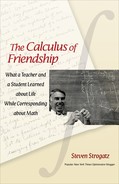Prologue
![]()
For the past thirty years I’ve been corresponding with my high school calculus teacher, Mr. Don Joffray. During that time, he went from the prime of his career to retirement, competed in whitewater kayak at the international level, and lost a son. I matured from teenage math geek to Ivy League professor, suffered the sudden death of a parent, and blundered into a marriage destined to fail.
What’s remarkable is not that any of this took place—such ups and downs are to be expected in three decades of life—but rather that so little of it is discussed in the letters. Instead, our correspondence, and our friendship itself, is based almost entirely on a shared love of calculus.
It never occurred to me how peculiar this is until Carole (I’m happily remarried now) teased me about it. “You’ve been writing to him for thirty years? You must know everything about each other.” Not really, I said. We just write about math problems. “That is such a guy thing,” she said, shaking her head.
Her question got me thinking. What did I really know about my teacher? Why had so much gone undiscussed between us? On the other hand, we both enjoyed our correspondence the way it was, so was there any problem here?
Questions like these have kept nagging at me. I’m not sure how to go about answering them or if I should even try. All the while, I find myself looking for clues in a green Pendaflex folder in my office, stuffed four inches thick with letters about math problems.
![]()
I was 15 when I took calculus from Mr. Joffray. One thing about him was unlike any other teacher I’d ever had: he worshipped some of his former students. He’d tell stories about them, legends that made them sound like Olympian figures, gods of mathematics. In my own case, he was more a fan than a teacher, always marveling at what problems I could invent and solve. It felt slightly strange to be so admired by my own teacher. But I can’t say I minded it.
After I graduated, something in me wanted to stay in touch with him. My first letters were about math problems that I thought he’d enjoy, gems I’d picked up in my college courses. The letters were infrequent, about one a year. I suppose he must have written back to me, but none of his responses have survived. It never occurred to me to save them.
It was only a decade later, when I was just starting my career as a professor, that our correspondence began to flourish. The pattern was always the same: Mr. Joffray would write to ask for help with a problem that had stumped him, typically a question raised by one of his seniors in the most advanced math class at the school. When one of these letters arrived in the mail, I stopped whatever I was doing to see if I could help. For one thing, they posed fascinating little questions, beautiful excursions off the beaten track of calculus. But maybe more importantly, they gave me a chance to explain math to someone who loved learning it, the best student any teacher could have, someone with perfect preparation and an evident sense of delight and gratitude.
With his retirement a few years ago and no more students to stimulate him, our correspondence began to wane. Not in frequency—in fact, he wrote to me more than ever—but in intensity and reciprocity. It got to the point where I simply couldn’t keep up with him. Yes, he reassured me, he understood all that, and urged me not to worry; he knew how busy I must be in my career and with all the new obligations that come with raising a family. But it still felt like we were drifting apart. Ironically, I was now the same age that he was when he taught me in high school.
In January 2004, yet another letter arrived. But this time I felt anxious when I saw the envelope. The uncharacteristically tremulous handwriting reminded me of my dad’s after his Parkinson’s had set in.
![]()
Sat. January 17, 2004
Dear Steve,
Eek! I had a mild stroke Thurs. noon and lost all sensation in my right (writing) hand. Several hours later I managed to open and close my fingers and get some strength back into my grip, but, alas, no dexterity! X@#! A one-handed piano player isn’t in demand, so I’ll miss my gig with our jazz quartet tomorrow. . . .
![]()
This glimpse of mortality awakened me to how much I’d been overlooking all these years. I felt compelled to visit Mr. Joffray at his home, to come to know the man behind the math.
![]()
Calculus is the mathematical study of change. Its essence is best captured by its original name, “fluxions,” coined by its inventor, Isaac Newton. The name calls to mind systems that are ever in motion, always unfolding.
Like calculus itself, this book is an exploration of change. It’s about the transformation that takes place in a student’s heart, as he and his teacher reverse roles, as they age, as they are buffeted by life itself. Through all these changes, they are bound together by a love of calculus. For them it is more than a science. It is a game they love playing together—so often the basis of friendship between men—a constant while all around them is in flux.
